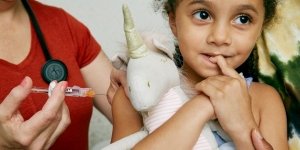Research Helps Explain Parental Hesitancy and Culpability When Vaccinating Their Children

Parenting can be one of the most rewarding experiences in one’s life. But it also comes with big decisions, such as vaccinating your child. While many view vaccinating children as extremely or very important, some parents may still be hesitant to vaccinate their children.
New research from Beth Vallen, PhD, associate professor of Marketing, seeks to better understand those hesitancies and how pediatricians and physicians can tailor their conversations to better understand what’s motivating parents’ decisions. The idea started several years ago when Vallen and one of her co-authors were new parents and noticed the difficult interplay between physicians and parents. It’s a complex relationship, particularly in the contexts of conversations about vaccinations. It got them to think about physician policy and how conversations could move people in one direction as it relates to vaccines, particularly childhood vaccinations.
Vaccine hesitancy can mean accepting or refusing some vaccines or delaying some or all of them. The reasons behind this hesitancy can vary, but can involve family schedules, finances or psychological issues. It is extremely important in this research to differentiate hesitancy and a lot of the current discussion around ‘anti-vaxxers’.
“This work isn’t about being pro or anti-vaccination,” Vallen says. “It’s more about the middle ground and recognizing that most people are not anti-vax. But there are obstacles that lead people to delay or start thinking about getting their child vaccinated.”
Prior research has examined omission bias in a vaccine context, meaning if risks and harm are the same (i.e. getting sick or infected), you would prefer to incur that harm from not vaccinating, rather than receiving the vaccination. Vallen’s new research takes this previous research a step further by looking at anticipated culpability: where patients are internalizing the blame and see themselves as the cause of the harm. This notion drives the omission bias.
In the study, patients were provided a vaccination policy from a doctor’s office. Vallen and her colleagues measured omission bias and how negatively they reacted towards the policy in order to determine how that related to their negative trust of their pediatrician and towards doctors in general, and more importantly, how they prioritized vaccinations before and after reviewing the policy. They found that those who demonstrate a greater tendency towards the omission bias (i.e. those who prefer harm from inaction to equivalent harm from action) experience greater negative reactions to vaccination policies, which in turn affects the downstream variables to how you feel about your pediatrician and how you prioritize vaccination.
The implications for this work are important, particularly given the increased discussions related to childhood vaccinations.
“Physicians need to focus on people as individuals, so when they are having these conversations with the patients, they can truly understand what’s motivating them,” says Vallen. “Then they can make a distinction between someone who has a psychological bias that they might be trying to overcome, versus someone who might simply need more information.”
Vallen notes as an example that a pediatrician could talk about the low percentage of risk and possibly, in turn, reduce culpability. If the doctor is talking to someone who is reactant and doesn’t like to be told what to do, there may be a way to have a conversation where the patient owns the decision, so they are not feeling pressured or being persuaded.
Since Vallen and her co-authors are not physicians and vaccine subject matter experts, they enlisted the support of Dr. Kristen Feemster, Director of Research for the Vaccine Education Center at Children’s Hospital of Philadelphia, to better inform the actual conversations physicians are having with parents and understand the sources of vaccine hesitancy.
While vaccinations for COVID-19 continue to rollout across the world, this current research was conducted prior to the pandemic. However, Vallen says there are connections that can be made.
“Omission bias is likely to play a role in vaccine decisions, particularly when you’re making choices for other people versus yourself. If I get a vaccine and have a negative side effect, I chose that for myself. Omission bias predicts that one may feel culpable and responsible for harm attributed to the decision to act, and that’s going to be accentuated when you’re making a decision for another person – your child, an elderly parent. This may be already at play in older populations, but I think we will continue to see this when kids start to get the COVID vaccine later this year.”
Vallen and her co-authors, who have studied decision making biases, recently published similar research in Human Vaccines & Immunotherapeutrics.
